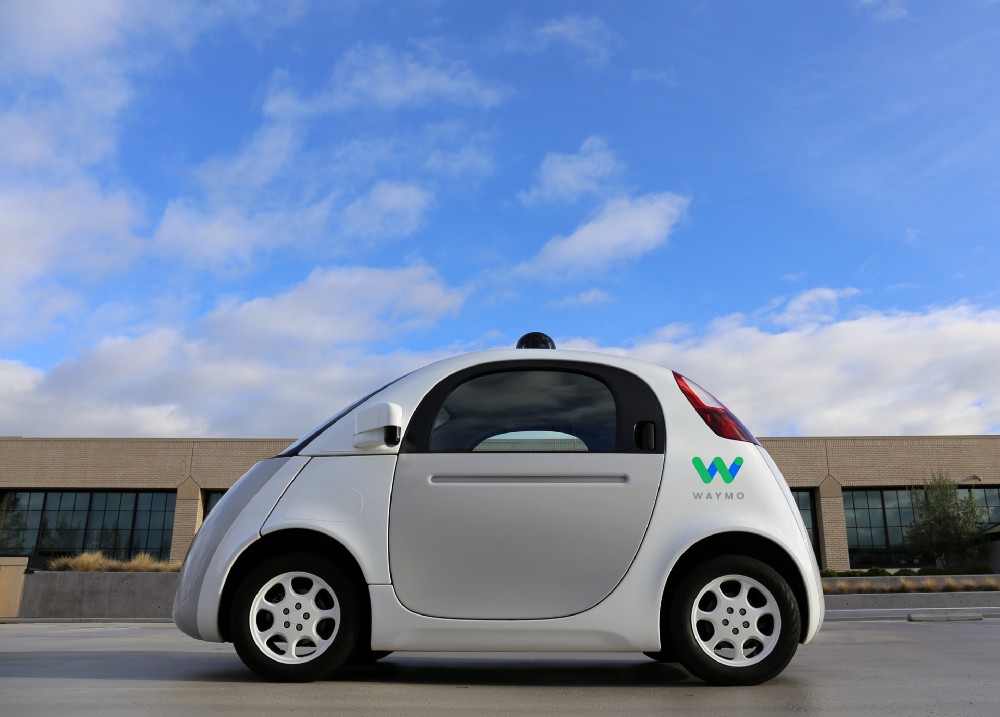|
Cars that drive themselves are coming soon! http://www.driverless-future.com/?page_id=384 Some people think they aren't though  http://www.forbes.com/sites/alanohnsman/2016/09/28/warning-driverless-cars-are-farther-than-they-appear/#36e6e1be17de This is where we discuss Autonomous Cars. They are cars that drive themselves without the input of a driver. Autonomous vehicles are classified by levels 0 through 5, 0 being your typical car and 5 being no human involvement besides starting the car and setting the destination. There are cars that are levels 1-3, offering things like automatic parking, retrieval, parallel parking, and advanced cruise control for freeways. Level 4 brings about some problems since drivers often mistake it for a fully autonomous vehicle. Most of the car industry is skipping level 4 and going straight for 5. We've already had our first death last year: Joshua Brown crashed into a semi while watching harry potter instead of the road, because his Tesla Model S couldn't tell the difference between the white trailer and the white sky. I generally believe the car industry will have fully automated vehicles on the road within the next 8 years. Some goons disagree. Every car manufacturer has varying estimates, usually around 2018 to 2024, but the farthest estimate is 2032 by some insurance think tank I've never heard of. Please note, this is a sensitive topic that has derailed related threads before. Be prepared.
|
|
|
|

|
| # ? Apr 26, 2024 04:59 |
|
The main thing I have still read nothing about, but I assume all those Silicon Valley engineers have considered, is what to do about the eye contact and body language element of driving, especially car and pedestrian interaction. Does anyone know anything? Or is the answer just "those things aren't actually necessary for driving"?
|
|
|
|
Samurai Sanders posted:The main thing I have still read nothing about, but I assume all those Silicon Valley engineers have considered, is what to do about the eye contact and body language element of driving, especially car and pedestrian interaction. Does anyone know anything? Or is the answer just "those things aren't actually necessary for driving"? I suspect it is the latter in conjunction with software to pick up the 'body language' of nearby vehicles rather than their drivers. For example, lets say we are both at a four way stop. I have right of way, but you are an idiot (sorry) and you keep creeping and clearly intend to go before me even though I came to a stop before you. While I could look at you, see your intent and flip you the bird, the self driving car would recognize the pattern of behavior (a shallow, incomplete stop followed by forward movement) that would suggest you were going to enter the intersection improperly and act accordingly. Pedestrian interaction I imagine is a lot harder for them to look at, though I suppose the counterpoint to that is that the self driving car is going to react far faster than the driver ever could. I might see someone, on the sidewalk but my brain isn't going to recognize them starting into the road until roughly the point they already have which means that in most cases I can think of, my foot would be going on the break roughly the same time as the computer jamming on it. At least, that would be the idea going forward I imagine. Right now who the gently caress knows (plenty of people who aren't me, presumably).
|
|
|
|
Samurai Sanders posted:The main thing I have still read nothing about, but I assume all those Silicon Valley engineers have considered, is what to do about the eye contact and body language element of driving, especially car and pedestrian interaction. Does anyone know anything? Or is the answer just "those things aren't actually necessary for driving"? At least initially I suspect there may be high-level input necessary from humans for some situations. High-level as in, "you hit a button on touchscreen when the traffic cop points for you to go" rather than "manually drive car with steering wheel". And you'll undoubtedly need to tell the car where it can park in many situations, like parking garages, where the car can't figure out the rules just by looking at a sign.
|
|
|
|
Freakazoid_ posted:
This exact thing happened in on of these threads where someone actually used a statement by the google program manager to the effect that they would have something in 2018 or so as proof.
|
|
|
|
Spazzle posted:Why do you believe these estimates to be remotely credible? I'm sure they have a ways to go with navigating bad weather and a bunch of weird edge cases, but it seems unlikely that it'll take 15+ years to fix those. Of course it's impossible to prove how long it'll take for some novel tech to develop one way or the other so yeah they're basically educated guesses.
|
|
|
|
I can certainly see manufacturers trying to push level 5 vehicles onto the streets in 8 years, but there's no way they actually make it past small test fleets in California suburbs. I know two Google X employees, and last I checked they have no solid plans on how to deal with things like snow, heavy rain, or fallen leaves (basically anything which obscures their edge detection). They're avoiding those issues until they can demonstrate level 5 in more favorable conditions. But those aren't "edge cases," at least one is absolutely guaranteed to happen virtually everywhere. ANIME AKBAR fucked around with this message at 15:12 on Jan 18, 2017 |
|
|
|
|
Cicero posted:Similarly: body language from traffic cops. I'm on my phone so I don't have the article handy at the moment, but I believe Ford (and if not Ford then one of the major automakers) claims to have the problem of traffic hand signals solved. I have a feeling that this kind of thing will mostly be a non-issue over time, though. It seems fairly trivial to just equip flaggers with devices that signal nearby self driving cars when a direction of travel is currently closed. ANIME AKBAR posted:I know two Google X employees, and last I checked they have no solid plans on how to deal with things like snow, heavy rain, or fallen leaves (basically anything which obscures their edge detection). They're avoiding those issues until they can demonstrate level 5 in more favorable conditions. But those aren't "edge cases," at least one is absolutely guaranteed to happen virtually everywhere. I keep saying this in self driving car threads, but Google is not the right company to look at for the bleeding edge here. Ford has already started testing their cars in snow and other inclement weather conditions and claims they'll be ready. I'm sure other automakers have as well, but just aren't being as vocal about it. Google/Waymo started pushing this stuff first, but they aren't the ones dumping money into it now.
|
|
|
|
ANIME AKBAR posted:I know two Google X employees, and last I checked they have no solid plans on how to deal with things like snow, heavy rain, or fallen leaves (basically anything which obscures their edge detection). They're avoiding those issues until they can demonstrate level 5 in more favorable conditions. But those aren't "edge cases," at least one is absolutely guaranteed to happen virtually everywhere. Paradoxish posted:I keep saying this in self driving car threads, but Google is not the right company to look at for the bleeding edge here. Ford has already started testing their cars in snow and other inclement weather conditions and claims they'll be ready. I'm sure other automakers have as well, but just aren't being as vocal about it. Google/Waymo started pushing this stuff first, but they aren't the ones dumping money into it now.
|
|
|
|
Paradoxish posted:I'm on my phone so I don't have the article handy at the moment, but I believe Ford (and if not Ford then one of the major automakers) claims to have the problem of traffic hand signals solved. I have a feeling that this kind of thing will mostly be a non-issue over time, though. It seems fairly trivial to just equip flaggers with devices that signal nearby self driving cars when a direction of travel is currently closed.
|
|
|
|
Autonomous cars are a solution in search of a problem. They are essentially a manifest white-techno-nerd destiny. Every single benefit that boosters of driverless cars point out about the technology can be had today using transportation methods that are much less expensive to run, much less carbon intensive to produce, and much less disruptive to existing communities.Human Transit posted:Musk assumes that transit is an engineering problem, about vehicle design and technology. In fact, providing cost-effective and liberating transportation in cities requires solving a geometry problem, and he’s not even seeing it. In this he’s repeating a common delusion, one I hear all the time in urbanist and technology circles.
|
|
|
|
Have there been any estimates on how much more an autonomous car will cost than a similar non-autonomous one? It seems to me that once they do start hitting the market the price could be a pretty big impediment to widespread adoption.
|
|
|
|
I did UX for autonomous cars at Ford and they're pushing hard for 2020 or so for fully autonomous. I work for GM right now, and they don't seem to be pushing hard and are more in a wait and see position/looking more at ride sharing in conjunction with that. It hugely varies by company, but the plan for the first fully autonomous is still in the early 2020s for the ones really pushing.
|
|
|
|
Cicero posted:What makes you think that? Waymo is even making its own sensors in-house now. Because building and selling cars is the primary business of car manufacturers and it's clear that none of them are willing to be left behind on this. A huge number of automakers are currently working on self driving car projects and most of them are estimating consumer availability in 3-5 years. I'm not saying that Waymo isn't doing good work or that they won't release something, but I have a feeling that established manufacturers are going to beat them to actually getting a consumer product out.
|
|
|
|
It honestly just seems like such a gimmick for anyone that isn't a taxi company or logistics company. There's no point putting it in consumer vehicles, because all those sensors & crap are going to cost a lot of money, and your convenience increase isn't high enough. For logistics & transit companies, it's also only going to make sense if they're 100% autonomous, so you can get rid of the driver completely. But even if autonomous cars can handle a lot of conditions, and follow well marked roads & etc etc, there are gonna be edge cases where they will just die, because they can't think strategically, or conceptually, in the same way a person can. But you know where I think this technology is going to work absolutely stunningly? Fixed route buses. If you know the exact route your bus is taking, know your robot bus can handle it perfectly, you don't have to worry about edge cases, then there's no reason to not replace your driver.
|
|
|
|
sitchensis posted:Autonomous cars are a solution in search of a problem. They are essentially a manifest white-techno-nerd destiny. Every single benefit that boosters of driverless cars point out about the technology can be had today using transportation methods that are much less expensive to run, much less carbon intensive to produce, and much less disruptive to existing communities. Fetishizing trains is like the most autistic nerd thing in the history.
|
|
|
|
Replace every road with rail track, that will totally work.
|
|
|
|
rudatron posted:It honestly just seems like such a gimmick for anyone that isn't a taxi company or logistics company. There's no point putting it in consumer vehicles, because all those sensors & crap are going to cost a lot of money, and your convenience increase isn't high enough. For logistics & transit companies, it's also only going to make sense if they're 100% autonomous, so you can get rid of the driver completely. But even if autonomous cars can handle a lot of conditions, and follow well marked roads & etc etc, there are gonna be edge cases where they will just die, because they can't think strategically, or conceptually, in the same way a person can. "I estimate there is a market for no more than fifty computers, globally" "Why would anybody want a computer in their home"
|
|
|
|
stichensis is right, automated cars are like the diet pill of traffic planning - allows you to drive all you want while pretending the inevitable consequences of your decisions will just magically disappear cars are a super important part of the american lifestyle, so people are consequently really jazzed about the first big new thing in cars in decades! but all of these promises about cars that don't wreck the established social order and actively perpetuate socioeconomic segregation, or allow us all to deal with whatever negative consequence of mass suburbia we can imagine, i mean, these things are a feature of the system https://www.youtube.com/watch?v=TwA7c_rNbJE&t=162s watch the above video for predictions of the future? what is a correct prediction? what seems laughably quaint? people have been trying to automate cars for nearly a hundred years now, with largely the same promises (don't need to pay attention to drive! more efficiency! reduce accidents) and it's interesting that you always see the same optimistic timeframes for adoption even though we have a feasible path forward for a working example of the tech needed in my view, self driving cars will address exactly two social problems of mass car use - the isolation of older people who are otherwise mobile but can no longer drive, and mass death/injury due to auto accidents. everything else is just overly optimistic futurist idealism Cicero posted:What makes you think that? Waymo is even making its own sensors in-house now. google has experience making fancy gadgets. they have no experience making cars car manufacturers have experience making cars, and some experience making fancy gadgets it's far more likely that waymo will license its technology than they will ever set up a production line, and that's assuming their tech is that much better than anyone else's Owlofcreamcheese posted:Fetishizing trains is like the most autistic nerd thing in the history. odd that the number one blind tech fetishist itt has a grudge against trains. sounds like overcompensation to me boner confessor fucked around with this message at 17:07 on Jan 18, 2017 |
|
|
|
rudatron posted:It honestly just seems like such a gimmick for anyone that isn't a taxi company or logistics company. Something like 53% of all Americans identify as suburban and the average one-way commute time is around 25 minutes. If you think there's no value to the average person in having that part of their day automated, then I really don't know what to say other than that your perspective is incredibly limited. People are right to point out that you can already get the benefits of an autonomous car by taking a bus and that this will likely just encourage more car use, but from a consumer perspective autonomous cars are going to be legitimately valuable to a lot of people. Autonomous cars may not be beneficial (they may even be harmful) on a social level, but they're certainly going to be beneficial on an individual level.
|
|
|
|
rudatron posted:But you know where I think this technology is going to work absolutely stunningly? Fixed route buses. If you know the exact route your bus is taking, know your robot bus can handle it perfectly, you don't have to worry about edge cases, then there's no reason to not replace your driver. boner confessor posted:in my view, self driving cars will address exactly two social problems of mass car use - the isolation of older people who are otherwise mobile but can no longer drive, and mass death/injury due to auto accidents. everything else is just overly optimistic futurist idealism
|
|
|
|
I just leave this here: http://selfdrivingcars.mit.edu/deeptrafficjs/
|
|
|
|
boner confessor posted:people have been trying to automate cars for nearly a hundred years now, with largely the same promises (don't need to pay attention to drive! more efficiency! reduce accidents) and it's interesting that you always see the same optimistic timeframes for adoption even though we have a feasible path forward for a working example of the tech needed A car 100 years ago was a model T with a hand crank starter what are you talking about.
|
|
|
|
Paradoxish posted:Something like 53% of all Americans identify as suburban and the average one-way commute time is around 25 minutes. If you think there's no value to the average person in having that part of their day automated, then I really don't know what to say other than that your perspective is incredibly limited. People are right to point out that you can already get the benefits of an autonomous car by taking a bus and that this will likely just encourage more car use, but from a consumer perspective autonomous cars are going to be legitimately valuable to a lot of people. it really depends on the premium placed on the tech, because it's going to take a while for the tech to have a big impact on society the first threshold to be passed is when someone releases a viable self-driving technology on the market. this will probably happen in the next decade the second threshold is when this technology is in common use. this is much further away, given that the average age of a car still being driven in america is 11 years and we can assume that not all new cars will have automatic features. there will be a lot of holdouts - older people resistant to change, people who distrust new technology, poor and young people who can't afford new technology, gearheads and car enthusiasts who refuse to let a machine drive them around, etc. few of the benefits of self driving cars will be evident when they're only 5% of the vehicles on the road in fact, i think the adoption of self driving cars will be slowed because the merits of the technology won't be practical at first - assume you're one of the few who gets a first or second gen self driver, and you use it to automate your commute. you probably do so illegally, because most jurisdictions will have laws on the books that say "you must pay attention" but you didn't get a self-driving car so that you'd pay attention to the road, so you join the legion of drivers who don't pay attention while they're driving (this is a huge problem with manually operated cars as well). except while playing on your phone or whatever the technology doesn't react well to the 90% of manually operated cars around you and you are injured in a crash. enough stories like this will hurt auto-driver sales and slow the adoption of the technology, specifically because you're not supposed to be doing the number one main thing everyone wants the technology for, removing the tedium of a long commute Owlofcreamcheese posted:A car 100 years ago was a model T with a hand crank starter what are you talking about. so? people were trying to automate them as early as 1926. for someone who blindly worships technology i'm suprised you don't know this p.s. electric and hybrid cars were both invented a hundred years ago too boner confessor fucked around with this message at 17:17 on Jan 18, 2017 |
|
|
|
quote:Autonomous cars are a solution in search of a problem. They are essentially a manifest white-techno-nerd destiny. Every single benefit that boosters of driverless cars point out about the technology can be had today using transportation methods that are much less expensive to run, much less carbon intensive to produce, and much less disruptive to existing communities. rudatron posted:It honestly just seems like such a gimmick for anyone that isn't a taxi company or logistics company. There's no point putting it in consumer vehicles, because all those sensors & crap are going to cost a lot of money, and your convenience increase isn't high enough.
|
|
|
|
quote:google has experience making fancy gadgets. they have no experience making cars quote:it's far more likely that waymo will license its technology than they will ever set up a production line
|
|
|
|
Cicero posted:As a cyclist I'd be stoked just about the safety improvements for myself. I got hit twice last year and while I wasn't hurt either time it was pretty terrifying (and my bike got jacked up the first time). In both cases it was just a driver not paying attention as they turned in perfectly normal driving conditions, something even a mediocre self-driving car wouldn't never do. there's going to be a rough learning period until self driving cars are safer for pedestrians/cyclists than humans. self driving cars are currently optimized for closed access highway travel, not driving in a complex and dense neighborhood where a majority of human/vehicle interactions take place Cicero posted:Do you seriously not see the massive convenience advantage of just being able to dick around in the car instead of drive it, or heck, even take a nap? This would be amazing for road trips, plus traffic is waaayyyy less frustrating if you're not actually driving. you mean, rotating the driver out? or taking a bus? the biggest and most uneqivocal advantage of self driving cars are convenience to the driver which is interesting juxtaposed for how self driving cars will be marketed, as a benefit to society because it's distasteful to say "i want the convenience of a long point to point commute in a privately owned vehicle without the inconvenience of paying attention to reality"
|
|
|
|
Paradoxish posted:Something like 53% of all Americans identify as suburban and the average one-way commute time is around 25 minutes. If you think there's no value to the average person in having that part of their day automated, then I really don't know what to say other than that your perspective is incredibly limited. People are right to point out that you can already get the benefits of an autonomous car by taking a bus and that this will likely just encourage more car use, but from a consumer perspective autonomous cars are going to be legitimately valuable to a lot of people. I think anywhere you can guarantee a very well structured environment, this tech is going to be a massive money saver. Maybe stuff like warehousing or ports or poo poo like that. Maybe if you have a Bus Rapid Transit system, you can have automated buses that just stick to that rapid transit system, without a driver. That'll go nuts. The promise gets harder to believe the noisier the environment gets though, and I feel like if it can't handle everything, there's no real point in buying it if you're like 90% of consumers, because who knows where you'll go, right?
|
|
|
|
Cicero posted:As a cyclist I'd be stoked just about the safety improvements for myself. I wouldn't expect self-driven cars to actually be safer to a degree that's more than margins of error. Better development of buses and light rail > more cars.
|
|
|
|
Cicero posted:It's a good thing they're not making cars then. oh they just said they werent a few weeks ago, pardon me for not keeping up to date on vague promises from tech giants  Agnosticnixie posted:Better development of buses and light rail > more cars. this is the practical and useful solution, but it's not nearly as exciting as expecting a shiny new invention to roll in and romantically change society because as first worlders and americans, that's been the experience of the 20th century boner confessor fucked around with this message at 17:26 on Jan 18, 2017 |
|
|
|
Cicero posted:As a cyclist I'd be stoked just about the safety improvements for myself. I got hit twice last year and while I wasn't hurt either time it was pretty terrifying (and my bike got jacked up the first time). In both cases it was just a driver not paying attention as they turned in perfectly normal driving conditions, something even a mediocre self-driving car wouldn't never do. Would you ever ride your bike on rail tracks? How about a lane segregated for bus services? How would you feel as a cyclist if the community you lived in started prioritizing infrastructure for cyclists rather than for vehicles? Like I pointed out, all the benefits of autonomous cars can be had with existing technologies. I for one would be thrilled if we started to orient the way we live around cycling/walking rather than driving. Because as a pedestrian and a cyclist, getting hit by a bike or another pedestrian is going to be a lot less deadly than being hit by a car, autonomous or not.
|
|
|
|
boner confessor posted:there's going to be a rough learning period until self driving cars are safer for pedestrians/cyclists than humans. quote:self driving cars are currently optimized for closed access highway travel, not driving in a complex and dense neighborhood where a majority of human/vehicle interactions take place quote:you mean, rotating the driver out? or taking a bus? the biggest and most uneqivocal advantage of self driving cars are convenience to the driver which is interesting juxtaposed for how self driving cars will be marketed, as a benefit to society because it's distasteful to say "i want the convenience of a long point to point commute in a privately owned vehicle without the inconvenience of paying attention to reality" Agnosticnixie posted:I wouldn't expect self-driven cars to actually be safer to a degree that's more than margins of error. Heck, once the sensors are there, self-driving cars will probably stop you from dooring cyclists, too.
|
|
|
|
rudatron posted:But that's only if you can make it perfectly autonomous, and not require constant human attention. Which is what people are promising, but can they deliver? This tech is going to work really really well in highly ordered & structured environments, and it's going to fail spectacularly in anything outside of that kind of environment, in any situation that requires you to think (which is more often than you may realize). The car companies are going to throw the legal disclaimer of 'yeah you should pay attention anyway' because if they don't, they'll get hit with lawsuits. So what's the point? You may be right and I don't really want to speculate on something that I don't have detailed insider knowledge about, but it's worth pointing out that this isn't what car companies are claiming right now. Ford is talking about releasing a mass produced, fully autonomous vehicle for ride sharing services in the next four years. It's possible they won't hit that target or that they're just outright lying about their intentions, but the industry has largely decided that Tesla-style "autopilot" is not the way forward and that's generally not what's being promised for the near future. Most car companies intend to skip over the step where you have a car that can drive itself, but only if you're paying careful attention to the road while it's doing so.
|
|
|
|
Cicero posted:IThen you don't have a very active imagination, or experience biking. I have enough of both, along with a healthy dose of cynicism towards nonsense claims from self aggrandizing techno-utopians.
|
|
|
|
boner confessor posted:this is the practical and useful solution, but it's not nearly as exciting as expecting a shiny new invention to roll in and romantically change society because as first worlders and americans, that's been the experience of the 20th century sitchensis posted:Would you ever ride your bike on rail tracks? How about a lane segregated for bus services? How would you feel as a cyclist if the community you lived in started prioritizing infrastructure for cyclists rather than for vehicles? quote:Like I pointed out, all the benefits of autonomous cars can be had with existing technologies. I for one would be thrilled if we started to orient the way we live around cycling/walking rather than driving. Because as a pedestrian and a cyclist, getting hit by a bike or another pedestrian is going to be a lot less deadly than being hit by a car, autonomous or not.
|
|
|
|
Cicero posted:I love transit but a) unfortunately heavy investment in transit is not nearly as realistic as mandating cars be self-driving after a certain point, and b) even with excellent transit you still end up with some driving (see: Tokyo). Building a train is mere sci-fi nonsense compared to a car that can drive itself!
|
|
|
|
I don't understand this "but what about trains!" thing, who is it directed at? Who is working on cars that should be building trains? As far as I know there isn't any massive government subsidies for self driving cars, and none of the companies building them are also train companies that could be working on their train division. What resource is being taken from trains by the companies that work on autonomous cars? If ford stopped working on it's cars how would that money get to train development? Is it that it needs to be a forbidden technology because if we make it people might not use trains? Should it be illegal to research like we are in dune? Or is it just impotent lament that if this happens trains get less attractive so it's sad that it will happen?
|
|
|
|
Paradoxish posted:You may be right and I don't really want to speculate on something that I don't have detailed insider knowledge about, but it's worth pointing out that this isn't what car companies are claiming right now. Ford is talking about releasing a mass produced, fully autonomous vehicle for ride sharing services in the next four years. It's possible they won't hit that target or that they're just outright lying about their intentions, They aren't lying. Most of their plans for non ride-share have overrides built in for weird-case scenarios.
|
|
|
|
I think it's more that self-driving cars are of benefit to a ultimately failed model of city geometry, characterized by low density suburban sprawl, that is going to implode in on itself eventually. It's not that car manufacturers are stealing from trains, but that there isn't any political will for transit investment and livable, higher density cities. I mean, I loving hate cars just because they're dirty and loud. Can you imagine how quiet cities were, before cars?
|
|
|
|

|
| # ? Apr 26, 2024 04:59 |
|
Cicero posted:I'm all for that but I also live in the real world where getting highly convenient self-driving technology rolled out is a hojillion times more realistic than Winning The War On Cars. And even walking/biking paradises like Houten still have some driving, there are some use cases where a car is necessary or vastly better than other options. Certainly, I'm not saying that driving should be abolished, it should just start to be de-emphasized. What's worrying to me about a lot of this AV talk is how it is sometimes used as a reason not to invest in transit initiatives and how we must start to think about how our cities should be redesigned to accomodate AV's. Like this video: https://www.youtube.com/watch?v=kh7X-UKm9kw Sure, it looks amazing -- those cars don't even have to stop for traffic lights! But where are the other users? The cyclists, the pedestrians who need to cross? They aren't represented at all. The logical end to this is that we segregate them. Yet this is a type of experiment we've tried before -- and our cities and communities suffered greatly for it, to the point now where we are literally trying to bury them.
|
|
|





















